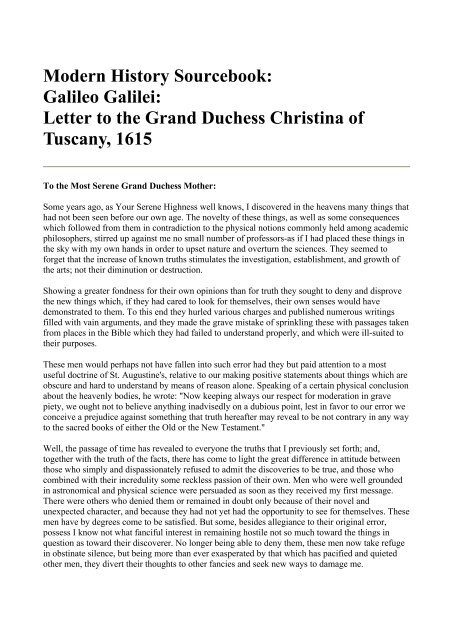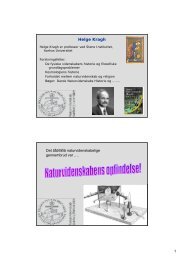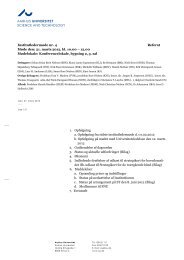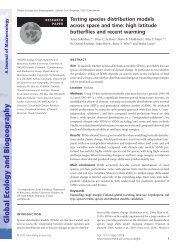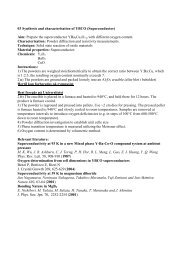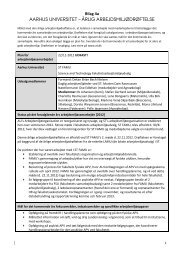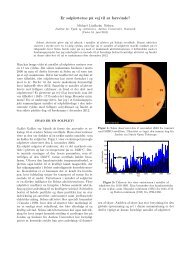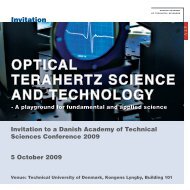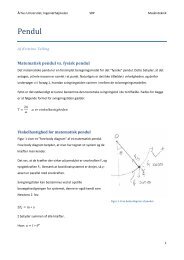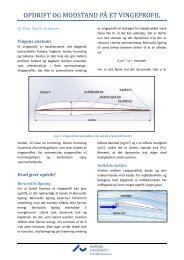Galileo Galilei: Letter to the Grand Duchess Christina of Tuscany, 1615
Galileo Galilei: Letter to the Grand Duchess Christina of Tuscany, 1615
Galileo Galilei: Letter to the Grand Duchess Christina of Tuscany, 1615
You also want an ePaper? Increase the reach of your titles
YUMPU automatically turns print PDFs into web optimized ePapers that Google loves.
astronomer. Since that time not only has <strong>the</strong> calendar been regulated by his teachings, but tables <strong>of</strong>all <strong>the</strong> motions <strong>of</strong> <strong>the</strong> planets have been calculated as well.Having reduced his system in<strong>to</strong> six books, he published <strong>the</strong>se at <strong>the</strong> instance <strong>of</strong> <strong>the</strong> Cardinal <strong>of</strong>Capua and <strong>the</strong> Bishop <strong>of</strong> Culm. And since he had assumed his laborious enterprise by order <strong>of</strong> <strong>the</strong>supreme pontiff, he dedicated this book On <strong>the</strong> celestial revolutions <strong>to</strong> Pope Paul III. When printed,<strong>the</strong> book was accepted by <strong>the</strong> holy Church, and it has been read and studied by everyone without<strong>the</strong> faintest hint <strong>of</strong> any objection ever being conceived against its doctrines. Yet now that manifestexperiences and necessary pro<strong>of</strong>s have shown <strong>the</strong>m <strong>to</strong> be well grounded, persons exist who wouldstrip <strong>the</strong> author <strong>of</strong> his reward without so much as looking at his book, and add <strong>the</strong> shame <strong>of</strong> havinghim pronounced a heretic. All this <strong>the</strong>y would do merely <strong>to</strong> satisfy <strong>the</strong>ir personal displeasureconceived without any cause against ano<strong>the</strong>r man, who has no interest in Copernicus beyondapproving his teachings.Now as <strong>to</strong> <strong>the</strong> false aspersions which <strong>the</strong>y so unjustly seek <strong>to</strong> cast upon me, I have thought itnecessary <strong>to</strong> justify myself in <strong>the</strong> eyes <strong>of</strong> all men, whose judgment in matters <strong>of</strong>` religion and <strong>of</strong>reputation I must hold in great esteem. I shall <strong>the</strong>refore discourse <strong>of</strong> <strong>the</strong> particulars which <strong>the</strong>se menproduce <strong>to</strong> make this opinion detested and <strong>to</strong> have it condemned not merely as false but as heretical.To this end <strong>the</strong>y make a shield <strong>of</strong> <strong>the</strong>ir hypocritical zeal for religion. They go about invoking <strong>the</strong>Bible, which <strong>the</strong>y would have minister <strong>to</strong> <strong>the</strong>ir deceitful purposes. Contrary <strong>to</strong> <strong>the</strong> sense <strong>of</strong> <strong>the</strong> Bibleand <strong>the</strong> intention <strong>of</strong> <strong>the</strong> holy Fa<strong>the</strong>rs, if I am not mistaken, <strong>the</strong>y would extend such authorities untileven m purely physical matters - where faith is not involved - <strong>the</strong>y would have us al<strong>to</strong>ge<strong>the</strong>rabandon reason and <strong>the</strong> evidence <strong>of</strong> our senses in favor <strong>of</strong> some biblical passage, though under <strong>the</strong>surface meaning <strong>of</strong> its words this passage may contain a different sense.I hope <strong>to</strong> show that I proceed with much greater piety than <strong>the</strong>y do, when I argue not againstcondemning this book, but against condemning it in <strong>the</strong> way <strong>the</strong>y suggest-that is, without understanding it, weighing it, or so much as reading it. For Copernicus never discusses matters <strong>of</strong> religionor faith, nor does he use argument that depend in any way upon <strong>the</strong> authority <strong>of</strong> sacred writingswhich he might have interpreted erroneously. He stands always upon physical conclusionspertaining <strong>to</strong> <strong>the</strong> celestial motions, and deals with <strong>the</strong>m by astronomical and geometricaldemonstrations, founded primarily upon sense experiences and very exact observations. He did notignore <strong>the</strong> Bible, but he knew very well that if` his doctrine were proved, <strong>the</strong>n it could notcontradict <strong>the</strong> Scriptures when <strong>the</strong>y were rightly unders<strong>to</strong>od and thus at <strong>the</strong> end <strong>of</strong> his letter <strong>of</strong>`dedication. addressing <strong>the</strong> pope, he said:"If <strong>the</strong>re should chance <strong>to</strong> be any exegetes ignorant <strong>of</strong>` ma<strong>the</strong>matics who pretend <strong>to</strong> skill in thatdiscipline, and dare <strong>to</strong> condemn and censure this hypo<strong>the</strong>sis <strong>of</strong> mine upon <strong>the</strong> authority <strong>of</strong> somescriptural passage twisted <strong>to</strong> <strong>the</strong>ir purpose, I value <strong>the</strong>m not, but disdain <strong>the</strong>ir unconsideredjudgment. For it is known that Lactantius - a poor ma<strong>the</strong>matician though in o<strong>the</strong>r respects a worthyauthor - writes very childishly about <strong>the</strong> shape <strong>of</strong> <strong>the</strong> earth when he sc<strong>of</strong>fs at those who affirm it <strong>to</strong>be a globe. Hence it should not seem strange <strong>to</strong> <strong>the</strong> ingenious if people <strong>of</strong> that sort should in turnderide me. But ma<strong>the</strong>matics is written for ma<strong>the</strong>maticians, by whom, if I am not deceived, <strong>the</strong>selabors <strong>of</strong> mine will be recognized as contributing something <strong>to</strong> <strong>the</strong>ir domain, as also <strong>to</strong> that <strong>of</strong> <strong>the</strong>Church over which Your Holiness now reigns."Such are <strong>the</strong> people who labor <strong>to</strong> persuade us that an author like Copernicus may be condemnedwithout being read, and who produce various authorities from <strong>the</strong> Bible, from <strong>the</strong>ologians, and from
"We must also take heed, in handling <strong>the</strong> doctrine <strong>of</strong> Moses. that we al<strong>to</strong>ge<strong>the</strong>r avoid sayingpositively and confidently anything which contradicts manifest experiences and <strong>the</strong> reasoning <strong>of</strong>philosophy or <strong>the</strong> o<strong>the</strong>r sciences. For since every truth is in agreement with all o<strong>the</strong>r truth, <strong>the</strong> truth<strong>of</strong> Holy Writ cannot be contrary <strong>to</strong> <strong>the</strong> solid reasons and experiences <strong>of</strong> human knowledge."And in St. Augustine we read:"If' anyone shall set <strong>the</strong> authority <strong>of</strong> Holy Writ against clear and manifest reason, he who does thisknows not what he has undertaken; for he opposes <strong>to</strong> <strong>the</strong> truth not <strong>the</strong> meaning <strong>of</strong> <strong>the</strong> Bible, whichis beyond his comprehension, but ra<strong>the</strong>r his own interpretation, not what is in <strong>the</strong> Bible, but what hehas found in himself and imagines <strong>to</strong> be <strong>the</strong>re."This granted, and it being true that two truths cannot contradict one ano<strong>the</strong>r, it is <strong>the</strong> function <strong>of</strong>exposi<strong>to</strong>rs <strong>to</strong> seek out <strong>the</strong> true senses <strong>of</strong> scriptural texts. These will unquestionably accord with <strong>the</strong>physical conclusions which manifest sense and necessary demonstrations have previously madecertain <strong>to</strong> us. Now <strong>the</strong> Bible, as has been remarked, admits in many places expositions that areremote from <strong>the</strong> signification <strong>of</strong> <strong>the</strong> words for reasons we have already given. Moreover, we areunable <strong>to</strong> affirm that all interpreters <strong>of</strong> <strong>the</strong> Bible speak by Divine inspiration for if that were so <strong>the</strong>rewould exist no differences among <strong>the</strong>m about <strong>the</strong> sense <strong>of</strong> a given passage. Hence I should think itwould be <strong>the</strong> part <strong>of</strong> prudence not <strong>to</strong> permit anyone <strong>to</strong> usurp scriptural texts and force <strong>the</strong>m in someway <strong>to</strong> maintain any physical conclusion <strong>to</strong> be true, when at some future time <strong>the</strong> senses anddemonstrative or necessary reasons may show <strong>the</strong> contrary. Who indeed will set bounds <strong>to</strong> humaningenuity? Who will assert that everything in <strong>the</strong> universe capable <strong>of</strong> being perceived is alreadydiscovered and known? Let us ra<strong>the</strong>r confess quite truly that "Those truths which we know are veryfew in comparison with those which we do not know."We have it from <strong>the</strong> very mouth <strong>of</strong> <strong>the</strong> Holy Ghost that God delivered up <strong>the</strong> world <strong>to</strong> disputations,so that man cannot find out <strong>the</strong> work that God hath done from <strong>the</strong> beginning even <strong>to</strong> <strong>the</strong> end. In myopinion no one, m contradiction <strong>to</strong> that dictum, should close <strong>the</strong> road <strong>to</strong> free philosophizing aboutmundane and physical things, as if everything had already been discovered and revealed withcertainty. Nor should it be considered rash not <strong>to</strong> be satisfied with those opinions which havebecome common. No one should be scorned in physical disputes for not holding <strong>to</strong> <strong>the</strong> opinionswhich happen <strong>to</strong> please o<strong>the</strong>r people best, especially concerning problems which have been debatedamong <strong>the</strong> greatest philosophers for thousands <strong>of</strong> years. One <strong>of</strong> <strong>the</strong>se is <strong>the</strong> stability <strong>of</strong> <strong>the</strong> sunmobility <strong>of</strong> <strong>the</strong> earth, a doctrine believed by Pythagoras and all his followers, by Heracleides <strong>of</strong>Pontus (who was one <strong>of</strong> <strong>the</strong>m), by Philolaus, <strong>the</strong> teacher <strong>of</strong> Pla<strong>to</strong>, and by Pla<strong>to</strong> himself according <strong>to</strong>Aris<strong>to</strong>tle. Plutarch writes in his Life <strong>of</strong> Numa that Pla<strong>to</strong>, when he had grown old, said it was absurd<strong>to</strong> believe o<strong>the</strong>rwise. The same doctrine was held by Aristarchus <strong>of</strong> Samos, as Archimedes tells us;by Seleucus <strong>the</strong> ma<strong>the</strong>matician, by Nicetas <strong>the</strong> philosopher (on <strong>the</strong> testimony <strong>of</strong> Cicero), and bymany o<strong>the</strong>rs. Finally this opinion has been amplified and confirmed with many observations anddemonstrations by Nicholas Copernicus. And Seneca, a most eminent philosopher, advises us in hisbook on comets that we should more diligently seek <strong>to</strong> ascertain whe<strong>the</strong>r it is in <strong>the</strong> sky or in <strong>the</strong>earth that <strong>the</strong> diurnal rotation resides.Hence it would probably be wise and useful counsel if, beyond articles which concern salvation and<strong>the</strong> establishment <strong>of</strong> our Faith, against <strong>the</strong> stability <strong>of</strong> which <strong>the</strong>re is no danger whatever that anyvalid and effective doctrine can ever arise, men would not aggregate fur<strong>the</strong>r articles unnecessarily.And it would certainly be preposterous <strong>to</strong> introduce <strong>the</strong>m at <strong>the</strong> request <strong>of</strong> persons, who, besides not
eing known <strong>to</strong> speak by inspiration <strong>of</strong> divine grace, are clearly seen <strong>to</strong> lack that understandingwhich is necessary in order <strong>to</strong> comprehend, let alone discuss, <strong>the</strong> demonstrations by which suchconclusions are supported in <strong>the</strong> subtler sciences. If I may speak my opinion freely, I should sayfur<strong>the</strong>r that it would perhaps fit in better with <strong>the</strong> decorum and majesty <strong>of</strong> <strong>the</strong> sacred writings <strong>to</strong>take measures for preventing every shallow and vulgar writer from giving <strong>to</strong> his compositions(<strong>of</strong>ten grounded upon foolish fancies) an air <strong>of</strong> authority by inserting in <strong>the</strong>m passages from <strong>the</strong>Bible, interpreted (or ra<strong>the</strong>r dis<strong>to</strong>rted) in<strong>to</strong> senses as far from <strong>the</strong> right meaning <strong>of</strong> Scripture as thoseauthors are near <strong>to</strong> absurdity who thus ostentatiously adorn <strong>the</strong>ir writings. Of such abuses manyexamples might be produced, but for <strong>the</strong> present I shall confine myself <strong>to</strong> two which are germane <strong>to</strong><strong>the</strong>se astronomical matters. The first concerns those writings which were published against <strong>the</strong>existence <strong>of</strong> <strong>the</strong> Medicean planets recently discovered by me, in which many passages <strong>of</strong> holyScripture were cited. Now that everyone has seen <strong>the</strong>se planets, I should like <strong>to</strong> know what newinterpretations those same antagonists employ in expounding <strong>the</strong> Scripture and excusing <strong>the</strong>ir ownsimplicity. My o<strong>the</strong>r example is that <strong>of</strong> a man who has lately published, in defiance <strong>of</strong> astronomersand philosophers, <strong>the</strong> opinion that <strong>the</strong> moon does not receive its light from <strong>the</strong> sun but is brilliant byits own nature. He supports this fancy (or ra<strong>the</strong>r thinks he does) by sundry texts <strong>of</strong> Scripture whichhe believes cannot be explained unless his <strong>the</strong>ory is true; yet that <strong>the</strong> moon is inherently dark issurely as plain as daylight.It is obvious that such authors, not having penetrated <strong>the</strong> true senses <strong>of</strong> Scripture, would imposeupon o<strong>the</strong>rs an obligation <strong>to</strong> subscribe <strong>to</strong> conclusions that are repugnant <strong>to</strong> manifest reason andsense, if <strong>the</strong>y had any authority <strong>to</strong> do so. God forbid that this sort <strong>of</strong> abuse should gain countenanceand authority, for <strong>the</strong>n in a short time it would be necessary <strong>to</strong> proscribe all <strong>the</strong> contemplativesciences. People who are unable <strong>to</strong> understand perfectly both <strong>the</strong> Bible and <strong>the</strong> science faroutnumber those who do understand <strong>the</strong>m. The former, glancing superficially through <strong>the</strong> Bible,would arrogate <strong>to</strong> <strong>the</strong>mselves <strong>the</strong> authority <strong>to</strong> decree upon every question <strong>of</strong> physics on <strong>the</strong> strength<strong>of</strong> some word which <strong>the</strong>y have misunders<strong>to</strong>od, and which was employed by <strong>the</strong> sacred authors forsome different purpose. And <strong>the</strong> smaller number <strong>of</strong> understanding men could not dam up <strong>the</strong> furious<strong>to</strong>rrent <strong>of</strong> such people, who would gain <strong>the</strong> majority <strong>of</strong> followers simply because it is much morepleasant <strong>to</strong> gain a reputation for wisdom without effort or study than <strong>to</strong> consume oneself tirelesslyin <strong>the</strong> most laborious disciplines. Let us <strong>the</strong>refore render thanks <strong>to</strong> Almighty God, who in Hisbeneficence protects us from this danger by depriving such persons <strong>of</strong> all authority, reposing <strong>the</strong>power <strong>of</strong> consultation, decision, and decree on such important matters in <strong>the</strong> high wisdom andbenevolence <strong>of</strong> most prudent Fa<strong>the</strong>rs, and in <strong>the</strong> supreme authority <strong>of</strong> those who cannot fail <strong>to</strong> ordermatters properly under <strong>the</strong> guidance <strong>of</strong> <strong>the</strong> Holy Ghost. Hence we need not concern ourselves with<strong>the</strong> shallowness <strong>of</strong> those men whom grave and holy authors rightly reproach, and <strong>of</strong> whom inparticular St. Jerome said, in reference <strong>to</strong> <strong>the</strong> Bible:"This is ventured upon, lacerated, and taught by <strong>the</strong> garrulous old woman, <strong>the</strong> doting old man, and<strong>the</strong> prattling sophist before <strong>the</strong>y have learned it. O<strong>the</strong>rs, led on by pride, weigh heavy words andphilosophize amongst women concerning holy Scripture. O<strong>the</strong>rs- oh shame!-learn from womenwhat <strong>the</strong>y teach <strong>to</strong> men, and (as if that were not enough) glibly expound <strong>to</strong> o<strong>the</strong>rs that which <strong>the</strong>y<strong>the</strong>mselves do not understand. I forebear <strong>to</strong> speak <strong>of</strong> those <strong>of</strong> my own pr<strong>of</strong>ession who, attaining aknowledge <strong>of</strong> <strong>the</strong> holy Scriptures after mundane learning, tickle <strong>the</strong> ears <strong>of</strong> <strong>the</strong> people with affectedand studied expressions, and declare that everything <strong>the</strong>y say is <strong>to</strong> be taken as <strong>the</strong> law <strong>of</strong> God. Notbo<strong>the</strong>ring <strong>to</strong> learn what <strong>the</strong> prophets and <strong>the</strong> apostles have maintained, <strong>the</strong>y wrest incongruoustestimonies in<strong>to</strong> <strong>the</strong>ir own senses-as if dis<strong>to</strong>rting passages and twisting <strong>the</strong> Bible <strong>to</strong> <strong>the</strong>ir individualand contradic<strong>to</strong>ry whims were <strong>the</strong> genuine way <strong>of</strong> teaching, and not a corrupt one."
I do not wish <strong>to</strong> place in <strong>the</strong> number <strong>of</strong> such lay writers some <strong>the</strong>ologians whom I consider men <strong>of</strong>pr<strong>of</strong>ound learning and devout behavior, and who are <strong>the</strong>refore held by me in great esteem andveneration Yet I cannot deny that I feel some discomfort which I should like <strong>to</strong> have removed, whenI hear <strong>the</strong>m pretend <strong>to</strong> <strong>the</strong> power <strong>of</strong> constraining o<strong>the</strong>rs by scriptural authority <strong>to</strong> follow in aphysical dispute that opinion which <strong>the</strong>y think best agrees with <strong>the</strong> Bible, and <strong>the</strong>n believe<strong>the</strong>mselves not bound <strong>to</strong> answer <strong>the</strong> opposing reasons and experiences. In explanation and suppor<strong>to</strong>f this opinion <strong>the</strong>y say that since <strong>the</strong>ology is queen <strong>of</strong> all <strong>the</strong> sciences, she need not bend in anyway <strong>to</strong> accommodate herself <strong>to</strong> <strong>the</strong> teachings <strong>of</strong> less worthy sciences which are subordinate <strong>to</strong> her;<strong>the</strong>se o<strong>the</strong>rs must ra<strong>the</strong>r be referred <strong>to</strong> her as <strong>the</strong>ir supreme empress, changing and altering <strong>the</strong>irconclusions according <strong>to</strong> her statutes and decrees. They add fur<strong>the</strong>r that if in <strong>the</strong> inferior sciencesany conclusion should be taken as certain in virtue <strong>of</strong> demonstrations or experiences, while in <strong>the</strong>Bible ano<strong>the</strong>r conclusion is found repugnant <strong>to</strong> this, <strong>the</strong>n <strong>the</strong> pr<strong>of</strong>essors <strong>of</strong> that science should<strong>the</strong>mselves undertake <strong>to</strong> undo <strong>the</strong>ir pro<strong>of</strong>s and discover <strong>the</strong> fallacies in <strong>the</strong>ir own experiences,without bo<strong>the</strong>ring <strong>the</strong> <strong>the</strong>ologians and exegetes. For, <strong>the</strong>y say, it does not become <strong>the</strong> dignity <strong>of</strong><strong>the</strong>ology <strong>to</strong> s<strong>to</strong>op <strong>to</strong> <strong>the</strong> investigation <strong>of</strong> fallacies in <strong>the</strong> subordinate sciences; it is sufficient for hermerely <strong>to</strong> determine <strong>the</strong> truth <strong>of</strong> a given conclusion with absolute authority, secure in her inability<strong>to</strong> err.Now <strong>the</strong> physical conclusions in which <strong>the</strong>y say we ought <strong>to</strong> be satisfied by Scripture, withoutglossing or expounding it in senses different from <strong>the</strong> literal, are those concerning which <strong>the</strong> Biblealways speaks in <strong>the</strong> same manner and which <strong>the</strong> holy Fa<strong>the</strong>rs all receive and expound in <strong>the</strong> sameway. But with regard <strong>to</strong> <strong>the</strong>se judgments I have had occasion <strong>to</strong> consider several things, and I shallset <strong>the</strong>m forth in order that I may be corrected by those who understand more than I do in <strong>the</strong>sematters-for <strong>to</strong> <strong>the</strong>ir decisions I submit at all times.First I question whe<strong>the</strong>r <strong>the</strong>re is not some equivocation in failing <strong>to</strong> specify <strong>the</strong> virtues which entitlesacred <strong>the</strong>ology <strong>to</strong> <strong>the</strong> title <strong>of</strong> "queen." It might deserve that name by reason <strong>of</strong> including everythingthat is included from all <strong>the</strong> o<strong>the</strong>r sciences and establishing everything by better methods and withpr<strong>of</strong>ounder learning. It is thus, for example, that <strong>the</strong> rules for measuring fields and keeping accountsare much more excellently contained in arithmetic and in <strong>the</strong> geometry <strong>of</strong> Euclid than in <strong>the</strong>practices <strong>of</strong> surveyors and accountants. Or <strong>the</strong>ology might be queen because <strong>of</strong> being occupied witha subject which excels in dignity all <strong>the</strong> subjects which compose <strong>the</strong> o<strong>the</strong>r sciences, and because herteachings are divulged in more sublime ways.That <strong>the</strong> title and authority <strong>of</strong> queen belongs <strong>to</strong> <strong>the</strong>ology in <strong>the</strong> first sense, I think, will not beaffirmed by <strong>the</strong>ologians who have any skill in <strong>the</strong> o<strong>the</strong>r sciences. None <strong>of</strong> <strong>the</strong>se, I think, will saythat geometry, astronomy, music, and medicine are much more excellently contained in <strong>the</strong> Biblethan <strong>the</strong>y are in <strong>the</strong> books <strong>of</strong> Archimedes, P<strong>to</strong>lemy, Boethius, and Galen. Hence it seems likely thatregal preeminence is given <strong>to</strong> <strong>the</strong>ology in <strong>the</strong> second sense; that is, by reason <strong>of</strong> its subject and <strong>the</strong>miraculous communication <strong>of</strong> divine revelation <strong>of</strong> conclusions which could not be conceived bymen in any o<strong>the</strong>r way, concerning chiefly <strong>the</strong> attainment <strong>of</strong> eternal blessedness.Let us grant <strong>the</strong>n that <strong>the</strong>ology is conversant with <strong>the</strong> l<strong>of</strong>tiest divine contemplation, and occupies <strong>the</strong>regal throne among sciences by dignity But acquiring <strong>the</strong> highest authority in this way, lf she doesnot descend <strong>to</strong> <strong>the</strong> lower and humbler speculations <strong>of</strong> <strong>the</strong> subordinate sciences and has no regard for<strong>the</strong>m because <strong>the</strong>y are not concerned with blessedness, <strong>the</strong>n her pr<strong>of</strong>essors should not arrogate <strong>to</strong><strong>the</strong>m-selves <strong>the</strong> authority <strong>to</strong> decide on controversies in pr<strong>of</strong>essions which <strong>the</strong>y have nei<strong>the</strong>r studiednor practiced. Why, this would be as if an absolute despot, being nei<strong>the</strong>r a physician nor an architect
ut knowing himself free <strong>to</strong> command, should undertake <strong>to</strong> administer medicines and erectbuildings according <strong>to</strong> his whim-at grave peril <strong>of</strong> his poor patients' lives, and <strong>the</strong> speedy collapse <strong>of</strong>his edifices.Again, <strong>to</strong> command that <strong>the</strong> very pr<strong>of</strong>essors <strong>of</strong> astronomy <strong>the</strong>mselves see <strong>to</strong> <strong>the</strong> refutation <strong>of</strong> <strong>the</strong>irown observations and pro<strong>of</strong>s as mere fallacies and sophisms is <strong>to</strong> enjoin something that lies beyondany possibility <strong>of</strong> accomplishment. For this would amount <strong>to</strong> commanding that <strong>the</strong>y must not seewhat <strong>the</strong>y see and must not understand what <strong>the</strong>y know, and that in searching <strong>the</strong>y must find <strong>the</strong>opposite <strong>of</strong> what <strong>the</strong>y actually encounter. Before this could be done <strong>the</strong>y would have <strong>to</strong> be taughthow <strong>to</strong> make one mental faculty command ano<strong>the</strong>r, and <strong>the</strong> inferior powers <strong>the</strong> superior, so that <strong>the</strong>imagination and <strong>the</strong> will might be forced <strong>to</strong> believe <strong>the</strong> opposite <strong>of</strong> what <strong>the</strong> intellect understands. Iam referring at all times <strong>to</strong> merely physical propositions, and not <strong>to</strong> supernatural things which arematters <strong>of</strong> faith.I entreat those wise and prudent Fa<strong>the</strong>rs <strong>to</strong> consider with great care <strong>the</strong> difference that existsbetween doctrines subject <strong>to</strong> pro<strong>of</strong> and those subject <strong>to</strong> opinion. Considering <strong>the</strong> force exerted bylogical deductions, <strong>the</strong>y may ascertain that it is not in <strong>the</strong> power <strong>of</strong>` <strong>the</strong> pr<strong>of</strong>essors <strong>of</strong> demonstrativesciences <strong>to</strong> change <strong>the</strong>ir opinions at will and apply <strong>the</strong>mselves first <strong>to</strong> one side and <strong>the</strong>n <strong>to</strong> <strong>the</strong> o<strong>the</strong>r.There is a great difference between commanding a ma<strong>the</strong>matician or a philosopher and influencinga lawyer or a merchant, for demonstrated conclusions about things in nature or in <strong>the</strong> heavenscannot be changed with <strong>the</strong> same facility as opinions about what is or is not lawful in a contract,bargain, or bill <strong>of</strong> exchange. This difference was well unders<strong>to</strong>od by <strong>the</strong> learned and holy Fa<strong>the</strong>rs,as proven by <strong>the</strong>ir having taken great pains in refuting philosophical fallacies. This may be foundexpressly in some <strong>of</strong> <strong>the</strong>m; in particular, we find <strong>the</strong> following words <strong>of</strong> St. Augustine:"It is <strong>to</strong> be held as an unquestionable truth that whatever <strong>the</strong> sages <strong>of</strong> this world have demonstratedconcerning physical matters is in no way contrary <strong>to</strong> our Bibles, hence whatever <strong>the</strong> sages teach in<strong>the</strong>ir books that is contrary <strong>to</strong> <strong>the</strong> holy Scriptures may be concluded without any hesitation <strong>to</strong> bequite false. And according <strong>to</strong> our ability let us make this evident, and let us keep <strong>the</strong> faith <strong>of</strong> ourLord, in whom are hidden all <strong>the</strong> treasures <strong>of</strong> wisdom so that we nei<strong>the</strong>r become seduced by <strong>the</strong>verbiage <strong>of</strong> false philosophy nor frightened by <strong>the</strong> superstition <strong>of</strong> counterfeit religion."From <strong>the</strong> above words I conceive that I may deduce this doctrine That in <strong>the</strong> books <strong>of</strong> <strong>the</strong> sages <strong>of</strong>this world <strong>the</strong>re are contained some physical truths which are soundly demonstrated, and o<strong>the</strong>rs thatare merely stated; as <strong>to</strong> <strong>the</strong> former, it i <strong>the</strong> <strong>of</strong>fice <strong>of</strong> wise divines <strong>to</strong> show that <strong>the</strong>y do not contradict<strong>the</strong> holy Scriptures And as <strong>to</strong> <strong>the</strong> propositions which are stated but not rigorously demonstrated,anything contrary <strong>to</strong> <strong>the</strong> Bible involved by <strong>the</strong>m must be held undoubtedly false and should beproved so by every possible means.Now if truly demonstrated physical conclusions need not be subordinated <strong>to</strong> biblical passages, but<strong>the</strong> latter must ra<strong>the</strong>r be shown not <strong>to</strong> interfere with <strong>the</strong> former, <strong>the</strong>n before a physical proposition iscondemned it must be shown <strong>to</strong> be not rigorously demonstrated-and this is <strong>to</strong> be done not by thosewho hold <strong>the</strong> proposition <strong>to</strong> be true, but by those who judge it <strong>to</strong> be false. This seems veryreasonable and natural, for those who believe an argument <strong>to</strong> be false may much more easily find<strong>the</strong> fallacies in it than men who consider it <strong>to</strong> be true and conclusive. Indeed, in <strong>the</strong> latter case it willhappen that <strong>the</strong> more <strong>the</strong> adherents <strong>of</strong> an opinion turn over <strong>the</strong>ir pages, examine <strong>the</strong> arguments,repeat <strong>the</strong> observations, and compare <strong>the</strong> experiences, <strong>the</strong> more <strong>the</strong>y will be confirmed in thatbelief. And Your Highness knows what happened <strong>to</strong> <strong>the</strong> late ma<strong>the</strong>matician <strong>of</strong> <strong>the</strong> University <strong>of</strong>
Pisa who under<strong>to</strong>ok in his old age <strong>to</strong> look in<strong>to</strong> <strong>the</strong> Copernican doctrine in <strong>the</strong> hope <strong>of</strong>` shaking itsfoundations and refuting it, since he considered it false only because he had never studied it. As itfell out, no sooner had he unders<strong>to</strong>od its grounds, procedures, and demonstrations than he foundhimself persuaded, and from an opponent he became a very staunch defender <strong>of</strong> it. I might alsoname o<strong>the</strong>r ma<strong>the</strong>maticians who, moved by my latest discoveries, have confessed it necessary <strong>to</strong>alter <strong>the</strong> previously accepted system <strong>of</strong> <strong>the</strong> world, as this is simply unable <strong>to</strong> subsist any longer.If in order <strong>to</strong> banish <strong>the</strong> opinion in question from <strong>the</strong> world it were sufficient <strong>to</strong> s<strong>to</strong>p <strong>the</strong> mouth <strong>of</strong> asingle man-as perhaps those men persuade <strong>the</strong>mselves who, measuring <strong>the</strong> minds <strong>of</strong> o<strong>the</strong>rs by <strong>the</strong>irown, think it impossible that this doctrine should be able <strong>to</strong> continue <strong>to</strong> find adherents-<strong>the</strong>n thatwould be very easily done. But things stand o<strong>the</strong>rwise. To carry out such a decision it would benecessary not only <strong>to</strong> prohibit <strong>the</strong> book <strong>of</strong> Copernicus and <strong>the</strong> writings <strong>of</strong> o<strong>the</strong>r authors who follow<strong>the</strong> same opinion, but <strong>to</strong> ban <strong>the</strong> whole science <strong>of</strong> astronomy. Fur<strong>the</strong>rmore, it would be necessary <strong>to</strong>forbid men <strong>to</strong> look at <strong>the</strong> heavens, in order that <strong>the</strong>y might not see Mars and Venus sometimes quitenear <strong>the</strong> earth and sometimes very distant, <strong>the</strong> variation being so great that Venus is forty times andMars sixty times as large at one time as at ano<strong>the</strong>r. And it would be necessary <strong>to</strong> prevent Venusbeing seen round at one time and forked at ano<strong>the</strong>r, with very thin horns; as well as many o<strong>the</strong>rsensory observations which can never be reconciled with <strong>the</strong> P<strong>to</strong>lemaic system in any way, but arevery strong arguments for <strong>the</strong> Copernican. And <strong>to</strong> ban Copernicus now that his doctrine is dailyreinforced by many new observations and by <strong>the</strong> learned applying <strong>the</strong>mselves <strong>to</strong> <strong>the</strong> reading <strong>of</strong> hisbook, after this opinion has been allowed and <strong>to</strong>lerated for <strong>the</strong>se many years during which it wasless followed and less confirmed, would seem in my judgment <strong>to</strong> be a contravention <strong>of</strong> truth, and anattempt <strong>to</strong> hide and suppress her <strong>the</strong> more as she revealed herself <strong>the</strong> more clearly and plainly. Not<strong>to</strong> abolish and censure his whole book, but only <strong>to</strong> condemn as erroneous this particular proposition,would (if I am not mistaken) be a still greater detriment <strong>to</strong> <strong>the</strong> minds <strong>of</strong> men, since it would afford<strong>the</strong>m occasion <strong>to</strong> see a proposition proved that it was heresy <strong>to</strong> believe. And <strong>to</strong> prohibit <strong>the</strong> wholescience would be <strong>to</strong> censure a hundred passages <strong>of</strong> holy Scripture which teach us that <strong>the</strong> glory andgreatness <strong>of</strong> Almighty God are marvelously discerned in all his works and divinely read in <strong>the</strong> openbook <strong>of</strong> heaven. For let no one believe that reading <strong>the</strong> l<strong>of</strong>ty concepts written in that book leads <strong>to</strong>nothing fur<strong>the</strong>r than <strong>the</strong> mere seeing <strong>of</strong> <strong>the</strong> splendor <strong>of</strong> <strong>the</strong> sun and <strong>the</strong> stars and <strong>the</strong>ir rising andsetting, which is as far as <strong>the</strong> eyes <strong>of</strong> brutes and <strong>of</strong> <strong>the</strong> vulgar can penetrate. Within its pages arecouched mysteries so pr<strong>of</strong>ound and concepts so sublime that <strong>the</strong> vigils, labors, and studies <strong>of</strong>hundreds upon hundreds <strong>of</strong> <strong>the</strong> most acute minds have still not pierced <strong>the</strong>m, even after <strong>the</strong>continual investigations for thousands <strong>of</strong> years. The eyes <strong>of</strong> an idiot perceive little by beholding <strong>the</strong>external appearance <strong>of</strong> a human body, as compared with <strong>the</strong> wonderful contrivances which a carefuland practiced ana<strong>to</strong>mist or philosopher discovers in that same body when he seeks out <strong>the</strong> use <strong>of</strong> allthose muscles, tendons, nerves, and bones; or when examining <strong>the</strong> functions <strong>of</strong> <strong>the</strong> heart and <strong>the</strong>o<strong>the</strong>r principal organs, he seeks <strong>the</strong> seat <strong>of</strong> <strong>the</strong> vital faculties, notes and observes <strong>the</strong> admirablestructure <strong>of</strong> <strong>the</strong> sense organs, and (without ever ceasing in his amazement and delight) contemplates<strong>the</strong> receptacles <strong>of</strong> <strong>the</strong> imagination, <strong>the</strong> memory, and <strong>the</strong> understanding. Likewise, that whichpresents itself <strong>to</strong> mere sight is as nothing in comparison with <strong>the</strong> high marvels that <strong>the</strong> ingenuity <strong>of</strong>learned men discovers in <strong>the</strong> heavens by long and accurate observation....Your Highness may thus see how irregularly those persons proceed who in physical disputesarrange scriptural passages (and <strong>of</strong>ten those illunders<strong>to</strong>od by <strong>the</strong>m) in <strong>the</strong> front rank <strong>of</strong> <strong>the</strong>irarguments. If <strong>the</strong>se men really believe <strong>the</strong>mselves <strong>to</strong> have <strong>the</strong> true sense <strong>of</strong> a given passage, itnecessarily follows that <strong>the</strong>y believe <strong>the</strong>y have in hand <strong>the</strong> absolute truth <strong>of</strong> <strong>the</strong> conclusion <strong>the</strong>yintend <strong>to</strong> debate. Hence <strong>the</strong>y must know that <strong>the</strong>y enjoy a great advantage over <strong>the</strong>ir opponents,
whose lot it is <strong>to</strong> defend <strong>the</strong> false position; and he who maintains <strong>the</strong> truth will have many senseexperiencesand rigorous pro<strong>of</strong>s on his side, whereas his antagonist cannot make use <strong>of</strong> anything butillusory appearances, quibbles, and fallacies. Now if <strong>the</strong>se men know <strong>the</strong>y have such advantagesover <strong>the</strong> enemy even when <strong>the</strong>y stay within proper bounds and produce no weapons o<strong>the</strong>r than thoseproper <strong>to</strong> philosophy, why do <strong>the</strong>y, in <strong>the</strong> thick <strong>of</strong> <strong>the</strong> battle, betake <strong>the</strong>mselves <strong>to</strong> a dreadfulweapon which cannot be turned aside, and seek <strong>to</strong> vanquish <strong>the</strong> opponent by merely exhibiting it? IfI may speak frankly, I believe <strong>the</strong>y have <strong>the</strong>mselves been vanquished, and, feeling unable <strong>to</strong> standup against <strong>the</strong> assaults <strong>of</strong> <strong>the</strong> adversary, <strong>the</strong>y seek ways <strong>of</strong> holding him <strong>of</strong>f. To that end <strong>the</strong>y wouldforbid him <strong>the</strong> use <strong>of</strong> reason, divine gift <strong>of</strong> Providence, and would abuse <strong>the</strong> just authority <strong>of</strong> holyScripture- which, in <strong>the</strong> general opinion <strong>of</strong> <strong>the</strong>ologians, can never oppose manifest experiences andnecessary demonstrations when rightly unders<strong>to</strong>od and applied. If I am correct, it will stand <strong>the</strong>m inno stead <strong>to</strong> go running <strong>to</strong> <strong>the</strong> Bible <strong>to</strong> cover up <strong>the</strong>ir inability <strong>to</strong> understand (let alone resolve) <strong>the</strong>iropponents' arguments, for <strong>the</strong> opinion which <strong>the</strong>y fight has never been condemned by <strong>the</strong> holyChurch. If <strong>the</strong>y wish <strong>to</strong> proceed in sincerity, <strong>the</strong>y should by silence confess <strong>the</strong>mselves unable <strong>to</strong>deal with such matters. Let <strong>the</strong>m freely admit that although <strong>the</strong>y may argue that a position is false, itis not in <strong>the</strong>ir power <strong>to</strong> censure a position as erroneous - or in <strong>the</strong> power <strong>of</strong> anyone except <strong>the</strong>Supreme Pontiff, or <strong>the</strong> Church Councils. Reflecting upon this, and knowing that a propositioncannot be both true and heretical, let <strong>the</strong>m employ <strong>the</strong>mselves in <strong>the</strong> business which is proper <strong>to</strong><strong>the</strong>m; namely, demonstrating its falsity. And when that is revealed, ei<strong>the</strong>r <strong>the</strong>re will no longer beany necessity <strong>to</strong> prohibit it (since it will have no followers), or else it may safely be prohibitedwithout <strong>the</strong> risk <strong>of</strong> any scandal.Therefore let <strong>the</strong>se men begin <strong>to</strong> apply <strong>the</strong>mselves <strong>to</strong> an examination <strong>of</strong> <strong>the</strong> arguments <strong>of</strong>Copernicus and o<strong>the</strong>rs, leaving condemnation <strong>of</strong> <strong>the</strong> doctrine as erroneous and heretical ' <strong>to</strong> <strong>the</strong>proper authorities. Among <strong>the</strong> circumspect and most wise Fa<strong>the</strong>rs, and in <strong>the</strong> absolute wisdom <strong>of</strong>one who cannot err, <strong>the</strong>y may never hope <strong>to</strong> find <strong>the</strong> rash decisions in<strong>to</strong> which <strong>the</strong>y allow <strong>the</strong>mselves <strong>to</strong> be hurried by some particular passion or personal interest. With regard <strong>to</strong> this opinion, ando<strong>the</strong>rs which are not directly matters <strong>of</strong> faith, certainly no one doubts that <strong>the</strong> Supreme Pontiff hasalways an absolute power <strong>to</strong> approve or condemn; but it is not in <strong>the</strong> power: <strong>of</strong> any created being <strong>to</strong>make things true or false, for this belongs <strong>to</strong> <strong>the</strong>ir own nature and <strong>to</strong> <strong>the</strong> fact. Therefore in myjudgment one should first be assured <strong>of</strong> <strong>the</strong> necessary and immutable truth <strong>of</strong> <strong>the</strong> fact, over whichno man has power. This is wiser counsel than <strong>to</strong> condemn ei<strong>the</strong>r side in <strong>the</strong> absence <strong>of</strong> suchcertainty, thus depriving oneself <strong>of</strong> continued authority and ability <strong>to</strong> choose by determining thingswhich are now undetermined and open and still lodged in <strong>the</strong> will <strong>of</strong> supreme authority. And inbrief, if it is impossible for a conclusion <strong>to</strong> be declared heretical while we remain in doubt as <strong>to</strong> itstruth, <strong>the</strong>n <strong>the</strong>se men are wasting <strong>the</strong>ir time clamoring for condemnation <strong>of</strong> <strong>the</strong> motion <strong>of</strong> <strong>the</strong> earthand stability <strong>of</strong> <strong>the</strong> sun, which <strong>the</strong>y have not yet demonstrated <strong>to</strong> be impossible or false ….


